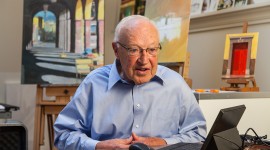"Wouldn't It Be Great?" - Bill Johnson's Unique Approach to People and Places
William “Bill” Johnson, an influential and beloved landscape architect who passed away on September 10, 2024, at age 93, is the subject of a forthcoming book, Framework Thinking: Lessons in Community Planning and Design, from ORO Editions due out in Spring 2025. In the book’s foreword, Charles A. Birnbaum, President & CEO of The Cultural Landscape Foundation (TCLF) says it “is accessible and easy to understand through its straightforward text and evocative graphics.”
The foreword also recalls the week-long oral history conducted with Johnson in 2015 during which “the production team had the good fortune to witness a planning and design leader at the top of his game.” It continues: “Bill revealed his process, which he called ‘Framework Thinking,’ and not only made it vastly accessible, but reflected on its refinement and fine-tuning throughout his career.
“What was remarkable is that Bill, through his words and his process-heavy graphics and drawings, made it easy for us to understand and engage with his unique approach to people and places—one that could be characterized as open and transparent. As our week together came to close, Bill reflected on more than a half century of practice, proclaiming with great excitement, ‘Wouldn't it be great if there was [a] more integrative thought when problem solving by our architecture friends and our engineering friends and those who do urban planning and design? Wouldn't it be great? I think it’s legitimate to say it isn’t happening now—but wouldn't it be great?’
“This quest for collaboration, and the critical role that landscape architects are positioned to play as ‘difference-makers,’ as Bill put it, has been at the forefront of his work ever since he graduated from the landscape architecture program at Michigan State University in East Lansing in 1953, and throughout his career.”

Johnson came of age in a profession, and a world, in transition. The postwar Modernist era was marked by the passing of hugely influential figures – Ellen Shipman (1950), Jens Jensen (1951), Frederick Law Olmsted, Jr. (1957) and Beatrix Farrand (1959) – and the ascent of new leaders such as Thomas Church, Garrett Eckbo, Lawrence Halprin, Dan Kiley, James Rose, John Simonds, Bob Zion, and Johnson’s classmate at the Harvard University Graduate School of Design, Peter Walker.
As the foreword notes, from his earliest days as a practitioner, Bill’s “ambition and strategic philosophy … prioritized fitness, harmony, and community engagement (built on a foundation of careful listening) as critical to context sensitive planning and design.” It adds: “Throughout his career and captured in Framework Thinking Bill encourages us to invite/welcome debate, and most critically, to think – and act – holistically. He challenges us by asking us are we ‘able, as a professional, to help [in the public] arena to see possible ideas? Possible outcomes that aren't immediately available to people who are just arguing, but that say wow, not only can I make my argument, but this could be an outcome. And the more quickly that's done on the spot, which takes skill, the better the debate and the more, the further you can reach towards an idea that is prevalent.’”
As Johnson said of himself in the 2015 oral history: “My work is not primarily art, as such, it's design. It's the solving of a challenge and [that] process takes me over to the social sciences more. I'm not a natural scientist or even close to being a pseudo-scientist. I lean on those guys big time to help what I do be solid and dependable, as I lean on the art world to help me in whatever I'm doing to not only create something that's artful, but to help others help me be artful. . . It says in a way that design is a big deal as a way of thinking with capital letters. It's not only form producing but process sensitive [emphasis added].”
The legacy of this master practitioner and esteemed university professor has yet to be fully understood, assessed, and appreciated. Framework Thinking is both a career capstone for Johnson and an important foundation for the next generation of leaders as they, like Johnson, face the seemingly intractable challenges of their era.





